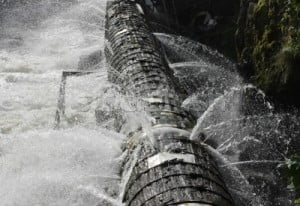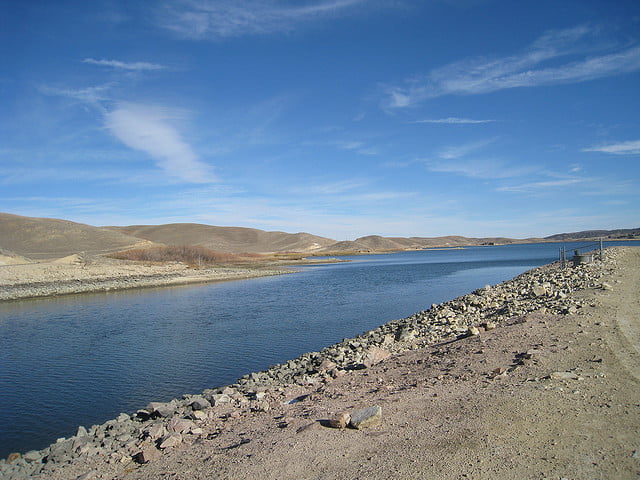According to the Asian Development Bank, Asia loses around 29 billion cubic metres of urban treated water every year due to leaking pipes, valued at nine billion dollars annually. The bank says that “by cutting physical losses to half the present level, 150 million people could be supplied with already treated water.”
And Asia is not the only leaking-pipe culprit, as across the world countries are facing massive water leaks. British newspapers recently claimed that the leading water firms in England and Wales are losing almost 300 million gallons a day through leaks, enough to supply the daily needs of 11 million people.
Startup TaKaDu is one of the many companies in Israel, a country with limited water resources, working on solutions to leaking pipes.
Related articles
TaKaDu was founded in 2009 by CEO Amir Peleg, and provides a water network monitoring system service that gives water utility companies the capability to monitor their network, detect leaks, bursts, inefficiencies and problems with their equipment or operational issues – all in real-time.

It is estimated that the world’s water infrastructures are losing 25 to 30 percent of water due to leaks.
“TaKaDu uses existing data from already available sensors and meters on the network,” Peleg tells to NoCamels. The service the company offers uses real-time data and compares it with corresponding data from days, week and even years before. TaKaDu’s Market Analyst Rotem Shemesh adds that what makes the system efficient is “taking into account the weather and other factors in the water network’s area, then weigh everything into an accurate prediction about the network’s behavior,” says Shemesh.
The comparison process occurs on the company’s online cloud system and is done through a unique mathematical model that the company developed, which consists of algorithms and statistical tools such as time-series-analysis systems and correlations. The company says that this mathematical model brings their system to a relatively accurate insight about the water network’s condition.
“Unlike computer networks or the internet, which are both effectively functioning via programs and algorithms, the water sector doesn’t operate through progressed tools like these,” says Peleg. “We bring the power of maths and algorithms to the water sector, and that is the wisdom and the innovation of our solution,” says Peleg.
Making a water network as smart as a computer network
When TaKaDu’s monitoring system locates a potential problem on the water network, it sends an online alarm to the water utility company and warns them that something is not effectively functioning on its network. “The efficiency of the water networks worldwide is very low,” says Peleg. “The proof for that is the amount of water loss due to failures, which I assume is between 25 and 30 percent”
Sign up for our free weekly newsletter
SubscribeAccording to Peleg, TaKaDu’s solution can be applied to other countries as well. “TaKaDu’s solution can work in Western countries, because they have a two-fold problem, on the one hand, their water networks are very old, and on the other hand, replacing all of their infrastructures now would cost a lot,” explains Peleg. When he refers to third world countries, Peleg says that the conditions there are different: “Third world countries mostly don’t have water networking infrastructures, they are just building them now.”
A ‘game changer’?
Accordingly, TaKaDu’s ten customers are spread over a few continents and include Britain’s largest water utility company, Jerusalem’s water utility company and several utilities in the Asia-Pacific and South America regions. The company charges a permanent monthly fee for its service by a SaaS (Software as a Service) business model. The fee is determined by the size of the city’s water network.
In 2011 TaKaDu won the ‘Technology Pioneers’ category in The World Economic Forum’s annual meeting in Davos, Geneva, a category reserved for companies that offer technology with a positive potential impact on people’s lives. The WEF declared that TaKaDu is going to change the way the water sector works, “Bringing in the [power of math] in the water sector is a very revolutionary thing to do,” says Peleg, “the WEF even called us, in their terminology, a ‘Game Changer’”.
Hoping for competition
Peleg, an alumni of Talpiot, the elite computer intelligence unit in the IDF, came up with the idea for TaKaDu after previously founding Uniper and YaData, which was acquired by Microsoft in 2008. “For a few months, I was [looking into] the water field,” says Peleg, “and after recognizing the problem and the potential, I founded the company with small resources.” The company has thirty employees and so far has successfully raised $15.5 million from leading Israeli VCs Giza and Gemini, as well as ABB and Emerald, an international clean-tech VC .
But TaKaDu has stiff competition from other Israeli companies like Stream Control, Hydrospin and Arad Group that also deal with water loss, using electric power or even Unmanned Aerial Vehicles. Shemesh says the difference is that these solutions necessarily involve a physical component: “TaKaDu’s system is unique because it’s Over the Web software that sends online updates after mathematical analysis of the data. Our solution involves nothing physical,” says Shemesh.
Peleg, on his part, actually welcomes competition: “Competition will be a blessing; it will make a lot of ‘positive noise’ about the market, and will only cause it to expand.”
Photo by Aquafornia
Related posts

Resilient And Nutritious New Plant-Based Milk Aims To Make A Splash

Chocolate From Cultivated Cocoa Comes Without Environmental Toll

Plastic Fantastic: Startup Takes PVC Back To Its Crude Oil Roots




Facebook comments